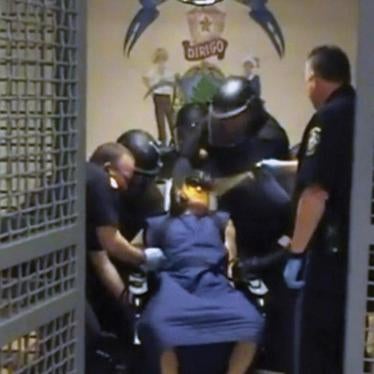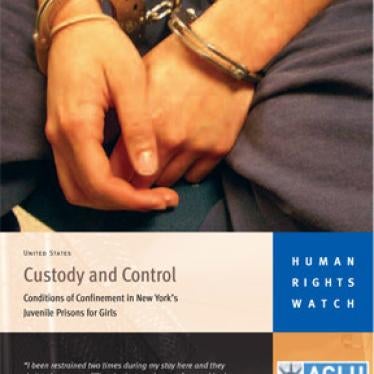Two powerful recent articles (here and here) look at how US prisons and jails operate as de facto mental health facilities, albeit woefully deficient ones.
Unfortunately, this is a longstanding tragedy. In 2003, Human Rights Watch published a long report on the phenomenon titled "Ill Equipped," a reference to the fact that prisons are as ill equipped to function as mental health facilities as prisoners with mental disabilities are to cope with the harsh strictures of prison life.
Little has changed in the last decade. Owing to budget constraints, prison mental health services continue to be crippled by understaffing, insufficient facilities, and limited programs. Untreated, under-treated, and mistreated prisoners with schizophrenia, bipolar disorder, and major depression, among other conditions, can be found in prisons throughout the US. Some rant and rave, babble incoherently, or huddle silently in their cells. Some beat their heads against cell walls, cover themselves with feces, self-mutilate or even kill themselves. Custodial staff often view them as difficult, disruptive troublemakers, and put them into solitary confinement for months and even years, a particularly devastating ordeal for those with mental disabilities.
To get a sense of just how bad it can be for prisoners with mental disabilities, read this recent court decision concerning the horrifying conditions in one of South Carolina’s prisons, where "inmates have died...for lack of basic mental health care"; or watch this video of prison guards pepper-spraying a prisoner with mental disabilities in California.
The high rate of incarceration of people with mental disabilities is largely a consequence of underfunded, disorganized, and fragmented community mental health services. People with serious mental disabilities – particularly if they are also poor, homeless, and suffering as well from alcoholism or drug addiction, as many are – cannot get the mental health help they need and all too often end up behind bars instead. Their incarceration also reflects decades of punitive criminal justice policies that lock up too many people for even minor crimes, instead of diverting them to community-based alternatives.
The solutions are easy to articulate. Create more free community mental health treatment and diversion programs so people with mental disabilities do not end up incarcerated. Mandate separate facilities operated on mental health rather than custodial principles, for those with mental disabilities who are convicted of crime and who cannot be safely based in the community. And provide resources to ensure that mental health treatment inside prisons meets community standards.
But to make those solutions happen will require far more commitment, compassion, and common sense than lawmakers have shown to date.








